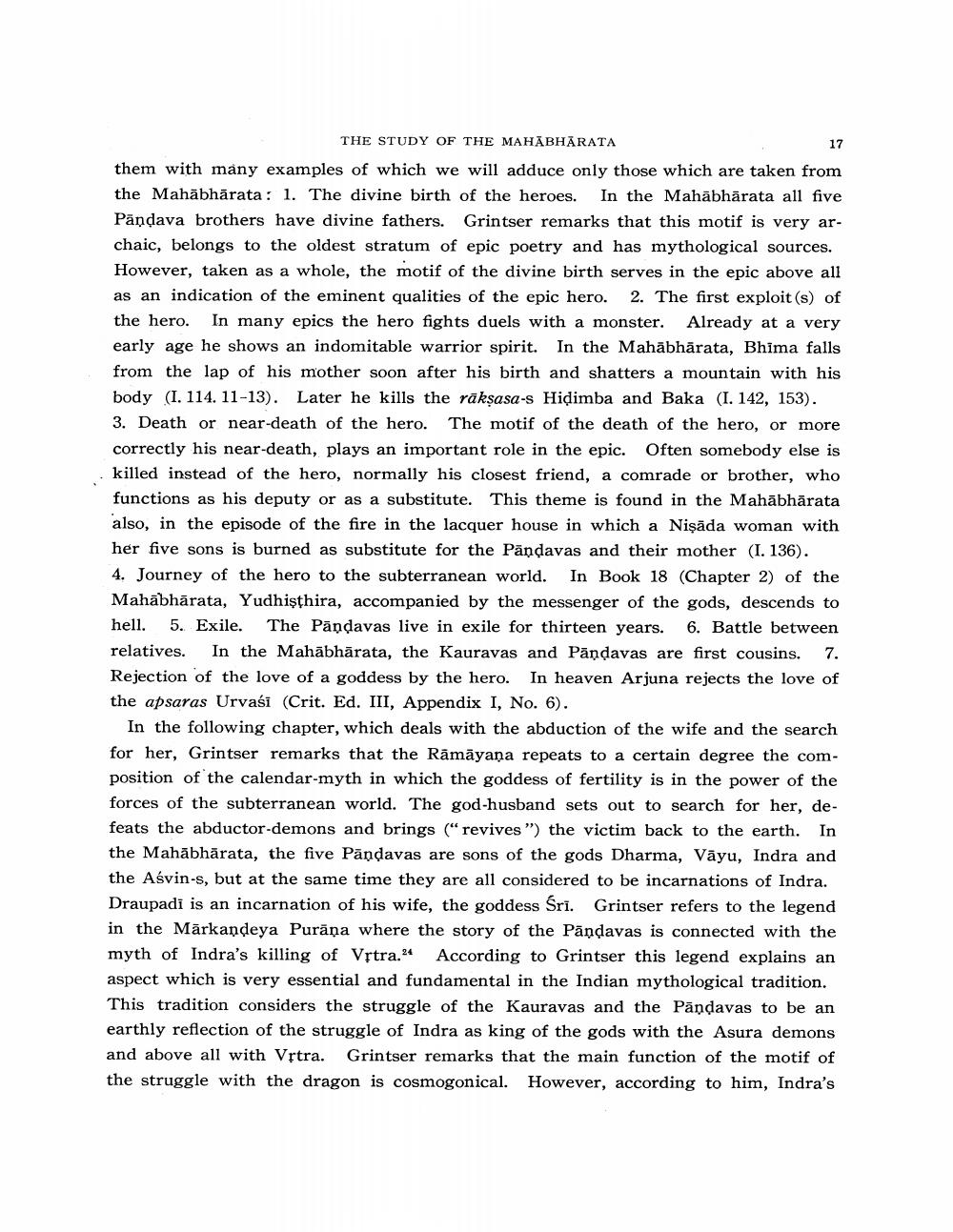________________
THE STUDY OF THE MAHABHARATA
17 them with many examples of which we will adduce only those which are taken from the Mahābhārata: 1. The divine birth of the heroes. In the Mahābhārata all five Pāņdava brothers have divine fathers. Grintser remarks that this motif is very archaic, belongs to the oldest stratum of epic poetry and has mythological sources. However, taken as a whole, the motif of the divine birth serves in the epic above all as an indication of the eminent qualities of the epic hero. 2. The first exploit(s) of the hero. In many epics the hero fights duels with a monster. Already at a very early age he shows an indomitable warrior spirit. In the Mahābhārata, Bhima falls from the lap of his mother soon after his birth and shatters a mountain with his body (I. 114. 11-13). Later he kills the rākşasa-s Hidimba and Baka (I. 142, 153). 3. Death or near-death of the hero. The motif of the death of the hero, or more correctly his near-death, plays an important role in the epic. Often somebody else is killed instead of the hero, normally his closest friend, a comrade or brother, who functions as his deputy or as a substitute. This theme is found in the Mahābhārata also, in the episode of the fire in the lacquer house in which a Nişāda woman with her five sons is burned as substitute for the Pāņdavas and their mother (I. 136). 4. Journey of the hero to the subterranean world. In Book 18 (Chapter 2) of the Mahābhārata, Yudhisthira, accompanied by the messenger of the gods, descends to hell. 5. Exile. The Pandavas live in exile for thirteen years. 6. Battle between relatives. In the Mahābhārata, the Kauravas and Pāndavas are first cousins. 7. Rejection of the love of a goddess by the hero. In heaven Arjuna rejects the love of the apsaras Urvasi (Crit. Ed. III, Appendix I, No. 6).
In the following chapter, which deals with the abduction of the wife and the search for her, Grintser remarks that the Rāmāyaṇa repeats to a certain degree the composition of the calendar-myth in which the goddess of fertility is in the power of the forces of the subterranean world. The god-husband sets out to search for her, defeats the abductor-demons and brings (“revives") the victim back to the earth. In the Mahābhārata, the five Pāņdavas are sons of the gods Dharma, Vāyu, Indra and the Asvin-s, but at the same time they are all considered to be incarnations of Indra. Draupadi is an incarnation of his wife, the goddess Sri. Grintser refers to the legend in the Mārkandeya Purāņa where the story of the Pāņdavas is connected with the myth of Indra's killing of Vrtra.24 According to Grintser this legend explains an aspect which is very essential and fundamental in the Indian mythological tradition. This tradition considers the struggle of the Kauravas and the Pandavas to be an earthly reflection of the struggle of Indra as king of the gods with the Asura demons and above all with Vrtra. Grintser remarks that the main function of the motif of the struggle with the dragon is cosmogonical. However, according to him, Indra's




